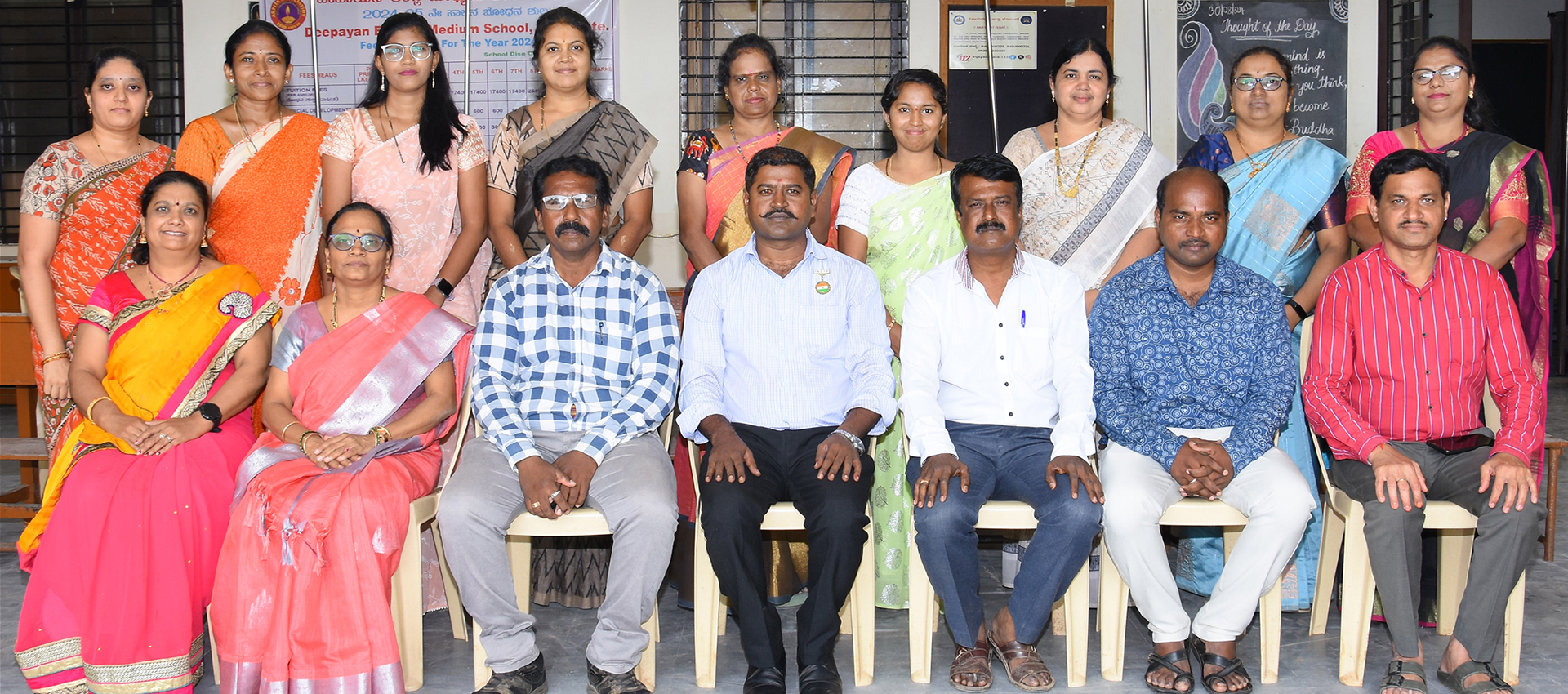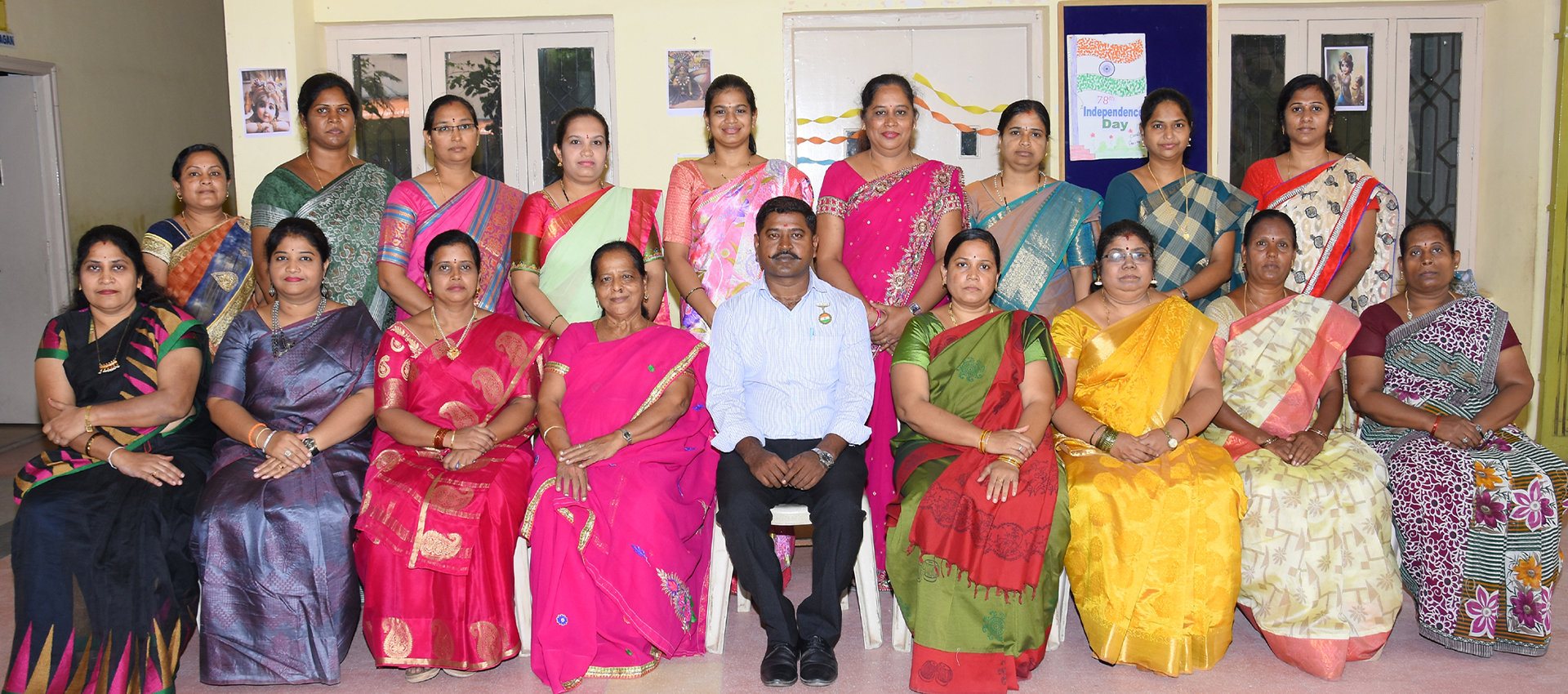ARPITA ASSOCIATION, HOSAPETE.
“Deepayan” - The Home of Light is an ordinary School building in the Nehru Co-operative Colony. It is not the structure but the spirit behind this house of Knowledge, which gives pleasure and satisfaction to the people involved with the school activities .As the President of Arpita Association I deem it my proud privilege to inform about the activities and achievement of our Association.
Arpita Association was formed in the year 1971 by a group of dedicated house-wives. It was decided to take up educational activity as our service to the society.
The need of a building to conduct the Nursery class was felt. The President of the Nehru Co-operative Building Society, Hospet was kind enough to grant us permission to run our Nursery class in their office building. We are highly indebted to the two organisations for the kind help they gave us in starting the Nursery class.
In the year 1977 we started the Primary School with the Iststandard and today we have teaching facilities up to 5th standard.
Though the progress was impressive we had to struggle hard to build up the school. I feel it would not be out of the way if I say a few words about the activities and achievements of our school.
Besides the usual studies we encourage the children to take interest in crafts, painting, singing, dramatics’ story telling, nature studies and sports. To see whether the curriculum is being followed properly one of the members of our Association visits the school every day.
We are proud to say that now we have our own school building and with the commencement of each year one new class is being added to the school .The headmistress of the school was sent for training and all expenses were paid by Association under its ‘Teachers Training Programme.’
We call two meetings of the parents and teachers to discuss the problems of children's education and ask for their valuable suggestions towards the improvement of the standard of education .The parents and teachers association meeting has enable us to have regular contact with the parents of the children studying in our school.
Every year we conduct School Day, Children's Day and other National days and in this connection sports and other competitions are conducted. The Annual Sports Day with our Band has enthusiastic participation by the teachers and students . Debate and speech making are regular activity .Information Boards display the drawings by children, newspaper cutting of recent events. Discussion on daily news is encouraged in the IV th standard and Vth standard.
The Fun-N-Fair is conducted every year for collection of funds . The Arpita Fun- Fair is looked forward to by the people of Hospet as an Annual Celebration.
I thank the philanthrophists of Hospet and others for their kind co-operation and generous donations for the construction of our School Building
An equal amount of thanks is due to all the members who work honourarily and without any expectation, for the benefit of the School.
By: Miss Chandrakanta Raya
President 1981 - 82
THE PROBLEMS OF THE PAST
On a warm summer afternoon as I watched a little sanskriti play 'School School', my thoughts travelled back into the past. My favourite game as a little girl was to play at being a teacher. I loved to teach anybody who was prepared to sit in front of my little black-board. My younger brother and sister along with, the maid servant and her children were common victims of this hobby. Being involved in the birth and growth of 'Deepayan' is a dream come true.
We saw children falling over each other in crowded jhatkas on their way to school. It started us thinking about a Nursery at Nehru Colony. At least the tiny-tots here would be saved the Jhatka ride. It seemed a good enough contribution to social welfare. We were a few housewives with vague ideas about education, but determined to make a genuine effort in improving the lot of the children in this fast growing town. Hospetians did not accept our ideas at first. They thought we were amusing ourselves. It was not true; the school meant lot to us. Every spare hour of our time is devoted to the school. It was and still remains a very vital part of our existence.
The opening of an English Medium School is a controversial affair. The parents cheer you while you struggle for the approval of the Education Department. The British have left behind their language whilst leaving the country.
The English language can be considered a mark of slavery, or a heritage of words. forming a golden-bond with the outside world. The origin of the English language reveals several connections with sanskrit. How then does it become different from Marathi-Tamil-Telugu or Kannada. English has become an Indian language, and it is time we accepted it without past inhibitions.
Indianising English is the goal of schools such as "Deepayan." We do not teach here anything with which the child fails to identify. stories from the Panchatantra and Aesop's fables are preferred to strange fairy-tales. The teachers are not fancy people from the city, who talk about things that the children have never seen or experienced but local trained graduates who understand the back- ground of the children of this town.
That makes me think of another problem which harassed. A teacher leaving the school was a big calamity. Telephones buzzed in the member's houses as we arranged to attend the class till we found a new teacher. It was surprising to know, how few considered it their responsibility to complete their work, or atleast give enough notice period to the School Management Committee. We were always there sharing the load of work. Fortunately now we have an extra-hand at school and in case of emergency the class in not left unattended. We also now have a responsible teaching-staff.
The 'Teacher's Training Programme' through which we sponsor local graduates for training, has proved a success .Our head-mistress Miss. Chinnamma was trained through this scheme; and to-day handles her post with great competence.
Ranks and marks was another issue which we argued out with the parents. It has always been our policy to discourage unhealthy competition in school. A few marks more or a few marks less; what does it really matter in the long run of life. Yet to-day education is completely mark-oriented and the children have to be made aware of this fact. We finally decided to settle for the grade system. This makes the
child realise his performance level, yet prevents him from becoming superior by two marks or inferior by five marks. This ways he is not isolated in achievement or failures.
The insistence upon writing A B C D and learning multiplication-tables was something that had to be handled very tactfully. "She has been to school for three months and she does not even write upto D." How were we to explain that the child would pick up fast once she gets used to the school atmosphere. In the initial stage when it is difficult to keep them from crying, how can they be expected to produce A B C like a typewriter. But now our parents have come to trust us and realise that though slow we are steady with a b c.
Multiplication-tables is still an issue unsolved, The children learn tables much before the concept of multiplication is taught to them. It would be better if they could concentrate upon the addition tables in the Nursery and K. G. Multiplication is learnt only at the end of First Standard. They understand what 2 X 1=2 actually means only when they are in the Second Standard.
A child should never be punished according to the Montessori principle. We tried very hard to implement this "no punishment" policy in the initial stages. We realised however that it was next to impossible as the teachers were also mere-human-beings and not saints. We standardised the punishments; so that the children are not made to suffer physically. The teachers know the mode of disciplining them.
For the teacher and for us the children are all part of a wholesome school society. They are little individuals struggling to form their own personalities. The parents and the school can help them on their way, but cannot possess them.
In the words of Khalil Gibran
"Your children are not your children. They are the sons and daughters of Life's longing for itself.
They come through you but not from you,
And though they are with you, yet they belong not to you.
You may give them your love but not your thoughts,
For they have their own thoughts.
You may house their bodies but not their souls,
For their dwell in the house of tomorrow,
Which you cannot visit. not even in your dreams
You may strive to be like them, but seek not to make them like you.
For life goes not backward nor tarries with yesterday.
You are the bows from which your children as living arrows are sent forth.
Mrs. Y S Ghorpade
1982











